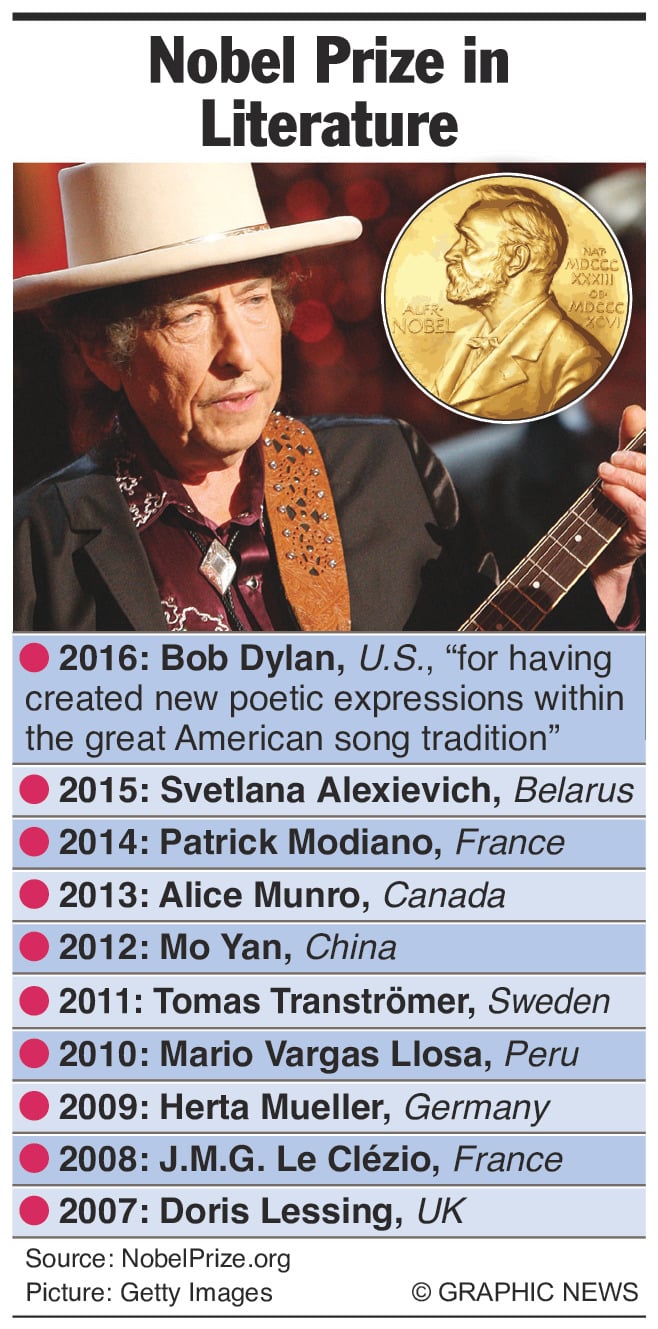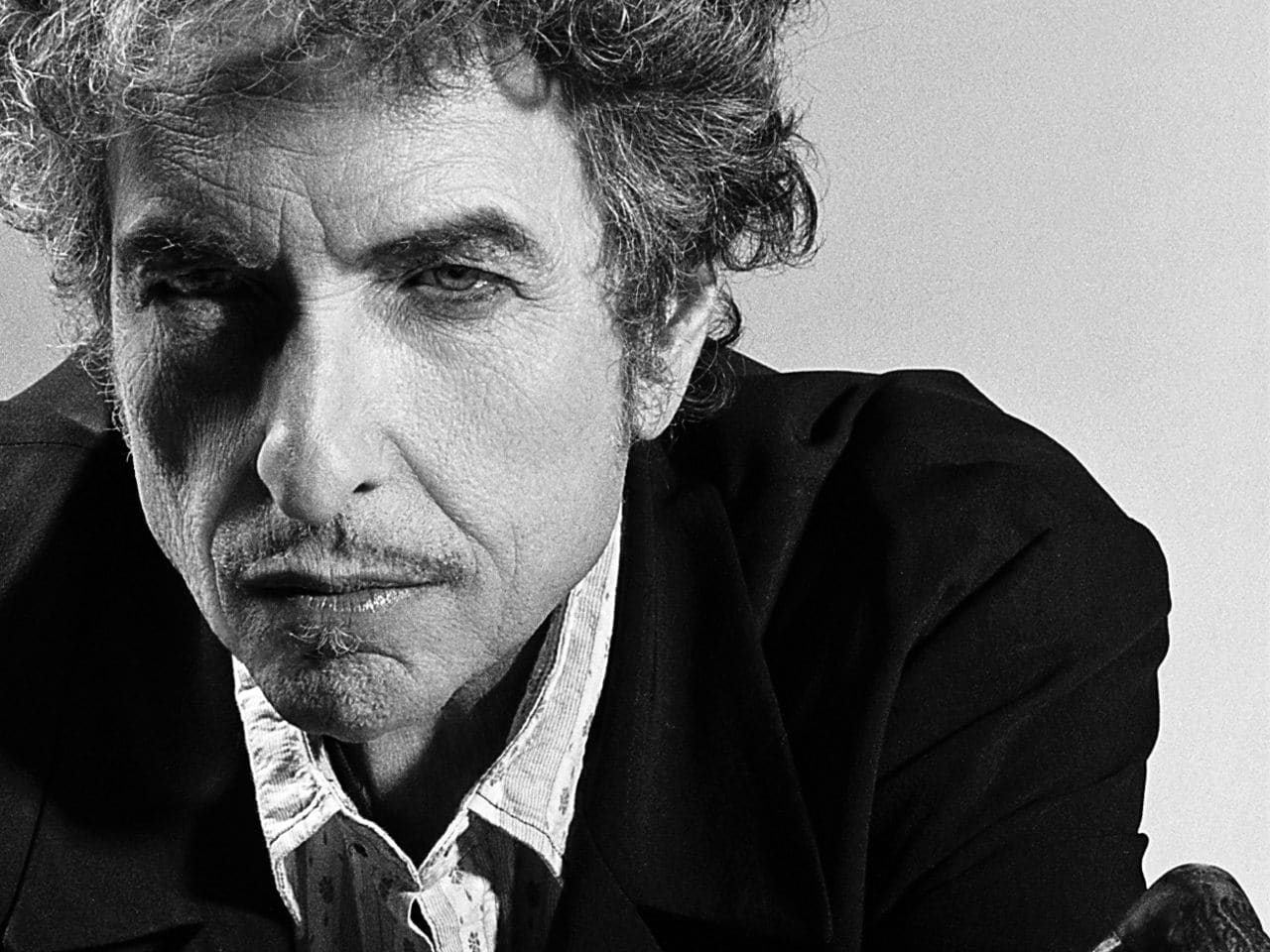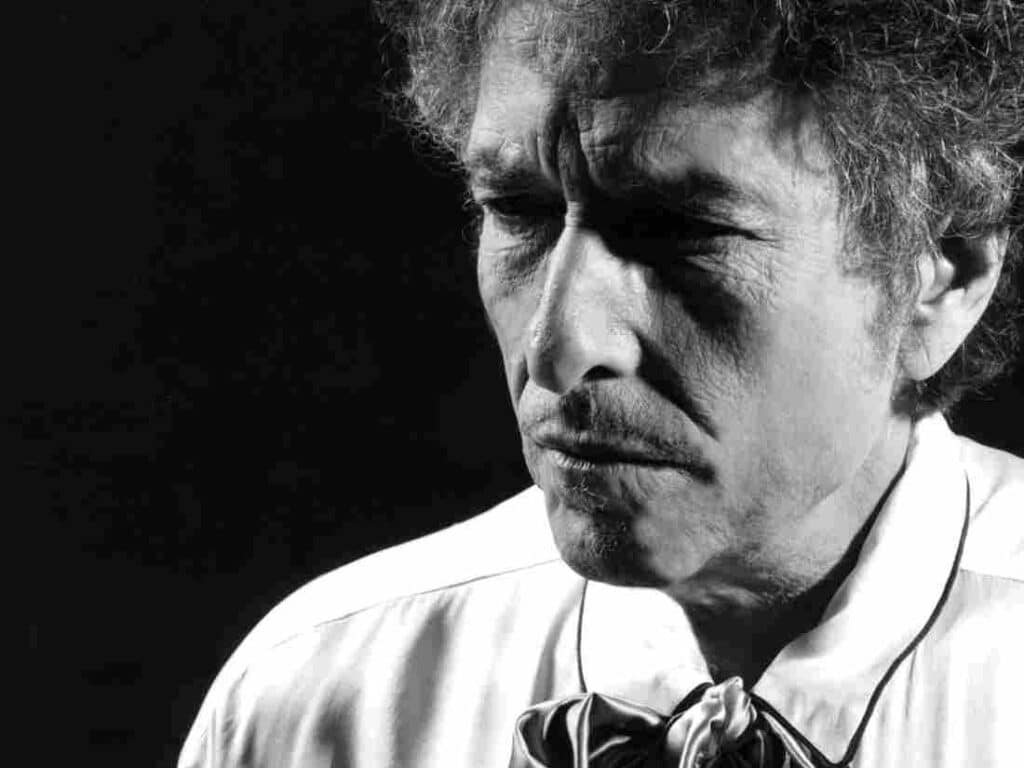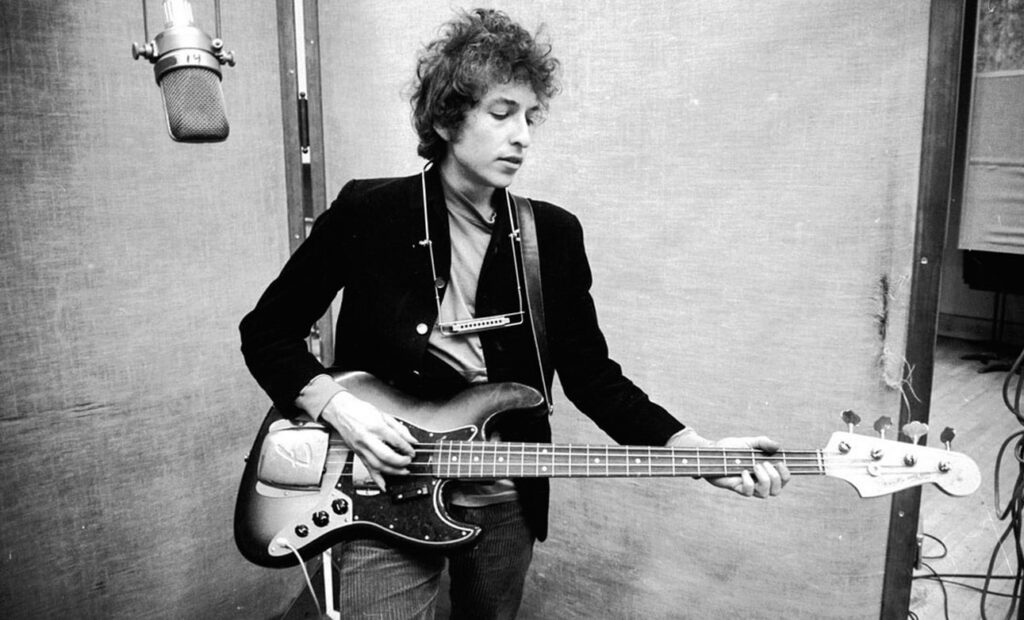Bob Dylan has won the 2016 Nobel Prize in Literature “for having created new poetic expressions within the great American song tradition.”
Nobel Prize permanent secretary Sara Danius said: “He is a great poet in the English tradition.”
Dylan is the first American to win the Nobel Prize in Literature since author Toni Morrison in 1993.
Speaking after the announcement, Danius compared Dylan to the Ancient Greek poets: “Homer and Sappho – they wrote poetic texts that were meant to be performed with instruments…. it’s the same with Bob Dylan,” she said.
Best known for his early hits such as Blowin’ in the Wind and Like a Rolling Stone, Dylan was a key member of the 1960s alternative folk movement, though he shocked his contemporaries by being one of the first folk musicans to “go electric” in 1965.
Sara Danius added that he was “a great sampler … and for 54 years he has been at it, reinventing himself.”

The 75-year-old American songwriter follows writers including Samuel Beckett, Harold Pinter and Alice Munro in receiving the prestigious award. Dylan has previously won 11 Grammy Awards, and an Oscar for his song Things Have Changed, used in the 2000 film Wonder Boys.
Though best known for his extensive career as a singer-songwriter, and his role as a pivotal figure in 1960s counter-culture, Dylan has also written a collection of experimental prose poetry, 1971’s Tarantula.
Bob Dylan is the first musician to win the award, and his selection is perhaps the most radical choice in a history stretching back to 1901. In choosing a popular musician for the literary world’s highest honor, the Swedish Academy, which awards the prize, dramatically redefined the boundaries of literature, setting off a debate about whether song lyrics have the same artistic value as poetry or novels.
Some prominent writers celebrated Mr. Dylan’s literary achievements, including Stephen King, Joyce Carol Oates and Salman Rushdie, who called Mr. Dylan “the brilliant inheritor of the bardic tradition,” adding, “Great choice.”
But others called the academy’s decision misguided and questioned whether song writing, however brilliant, rises to the level of literature.
Bob Dylan has often sprinkled literary allusions into his music and cited the influence of poetry on his lyrics, and has referenced Arthur Rimbaud, Paul Verlaine and Ezra Pound.
Literary scholars have long debated whether Dylan’s lyrics can stand on their own as poetry, and an astonishing volume of academic work has been devoted to parsing his music. The Oxford Book of American Poetry included his song “Desolation Row,” in its 2006 edition, and Cambridge University Press released “The Cambridge Companion to Bob Dylan” in 2009, further cementing his reputation as a brilliant literary stylist.
In giving the literature prize to Bob Dylan, the Academy may also be recognizing that the gap has closed between high art and more commercial creative forms.
“It’s literature, but it’s music, it’s performance, it’s art, it’s also highly commercial,” said David Hajdu, a music critic for The Nation who has written extensively about Bob Dylan and his contemporaries. “The old categories of high and low art, they’ve been collapsing for a long time, but this is it being made official.”
It’s not the first time the Academy has stretched the definition of literature. In 1953, Winston Churchill received the prize, in part as recognition of the literary qualities of his soaring political speeches and “brilliant oratory in defending exalted human values,” according to the Academy. And many were surprised last year, when the prize went to the Belarussian journalist Svetlana Alexievich, whose deeply reported narratives draw on oral history.
Bob Dylan, whose original name is Robert Allen Zimmerman, was born on May 24, 1941, in Duluth, Minn. He emerged on the New York music scene in 1961 as an artist singing protest songs and strumming an acoustic guitar in clubs and cafes in Greenwich Village. But from the start he stood out for dazzling lyrics and an oblique song writing style that made him a source of fascination for artists and critics. In 1963, the folk group Peter, Paul and Mary reached No. 2 on the Billboard pop chart with a version of “Blowin’ in the Wind,” whose ambiguous refrains evoked Ecclesiastes.
Within a few years Bob Dylan was confounding the very notion of folk music, with ever more complex songs and moves toward a more rock ’n’ roll sound.
After reports of a motorcycle accident in 1966 near his home in Woodstock, N.Y., he withdrew further from public life but remained intensely fertile as a songwriter. His voluminous archives, showing his working process through thousands of pages of song writing drafts, were acquired this year by institutions in Tulsa, Okla.
source: The Telegraph
Can you match Bob Dylan’s lyrics with the title of his songs?
1. Knocking on Heaven’s Door | a. Hey! Mr Tambourine Man, play a song for me I’m not sleepy and there is no place I’m going to Hey! Mr Tambourine Man, play a song for me In the jingle jangle morning I’ll come followin’ you. |
2. Forever Young | b. How many roads must a man walk down Before you call him a man? How many seas must a white dove sail Before she sleeps in the sand? Yes, and how many times must the cannon balls fly Before they’re forever banned? |
3. Blowing’ in the Wind | c. How does it feel? How does it feel To be without a home Like a complete unknown…
|
4. Like a Rolling Stone | d. May God bless and keep you always May your wishes all come true May you always do for others And let others do for you May you build a ladder to the stars And climb on every rung. |
5.Mr Tambourine Man | e. Mama, put my guns in the ground I can’t shoot them anymore. That long black cloud is comin’ down I feel I’m knockin’ on heaven’s door. |
Key
1. e.
2. d.
3. b.
4. c.
5. a.
Vocabulary
announcement | bejelentés |
instrument | hangszer |
contemporary | kortárs |
pivotal | alapvető |
experimental | kísérletező, kísérleti |
to stretch back | visszanyúlni |
boundary | határ |
to set off a debate | vitát szítani |
artistic value | művészi érték |
novel | regény |
prominent | kiváló, kitűnő |
inheritor | örökös |
misguided | téves meggondolású |
to sprinkle | hinteni |
allusion | célzás |
to cite | idézni |
influence | befolyás |
astonishing | lenyűgöző |
to devote to sg | valaminek szentelni |
to parse | elemezni |
to cement | megszilárdítani |
reputation | hírnév |
gap | rés, szakadék |
extensively | kiterjedten |
to collapse | összedőlni |
to stretch | kiterjeszteni |
recognition | elismerés |
oratory | szónok |
to defend | megvédeni |
exalted | emelkedett, fennkölt |
to strum | pengetni |
dazzling | káprázatos |
oblique | indirekt |
ambiguous | kétértelmű, homályos |
to evoke | felidézni |
Ecclesiastes | a Prédikátor könyve a Bibliában |
to confound | összekeverni |
fertile | termékeny |
voluminous | terjedelmes, sokkötetes |







